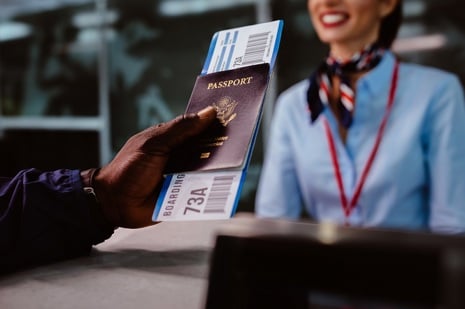
The airline industry around the world has an ongoing problem with effectively identifying passenger travel documents for validation and compliance purposes. With the increase in passenger volume, a higher number of travel documents need to be processed within a short amount of time. Some unavoidable processes require check-in agents to manually verify these travel documents, which is extremely time-consuming.
During the COVID pandemic, we learnt that different countries introduced numerous entry regulations with a variety of vaccination and test certificates which was not standardized and required manual verification. On top of that, different countries have different types of travel documents and visas that have their own specific format, security features, and validation requirements. This adds complexity to the manual verification process by the check-in agents, making them prone to errors.
Furthermore, part of the current manual check-in process is not scalable enough to handle the year-on-year increase in passenger volume. As air travel continues to grow and suppresses the pre-COVID levels, relying solely on manual travel document verification becomes increasingly inefficient and impractical. Agent error is one of the main concerns for airlines, as mistakes in travel document verification checks can lead to non-compliance and hefty fines.
The best way to remedy this challenge is for the airline industry to implement a digital travel document management system. Airlines can automate the complex process of identification and processing of these travel documents by digitalizing the travel document library and leveraging technology such as an optical character reader (OCR) and smart data extraction.
Streamlining data extraction for both check-in agents and traveling passengers reduces manual effort and minimizes human error. Additionally, embracing travel document verification systems that can integrate with a large database and employ secure authentication methods will enhance the authenticity and validity of this travel document verification process.
By leveraging digital identity and biometric technologies, airlines can streamline the authentication process and offer a contactless process in a privacy-protecting manner.
Collaboration and standardization within the industry are crucial. Establishing common data formats, protocols and interfaces for data exchange between traveling passengers, airlines, airports and regulatory authorities is needed to achieve efficiency and interoperability. This effort is led by the IATA initiative One ID. IATA has been working with airlines, airports, government authorities and solution providers to develop industry standards and recommendations.
One ID aims to transform the traveling passenger journey using digital identity and biometric technologies with two primary focuses:
IATA has developed Recommended Practices and is developing associated technical specifications with alpha Verifiable Credential specifications now available for testing.
In summary, the airline industry can address the challenge of passenger travel document validation process and compliance by implementing digital travel document management systems, utilizing digital identity and biometric identification technologies, promoting collaboration and standardization which will be able to streamline operations, improve passenger experience and most importantly, ensure that compliance is met and further enable a contactless process.
Every year, Timatic offers airlines and ground handlers the best solutions to check over 700 million passengers to ensure their customers arrive at the airport with valid travel documents.